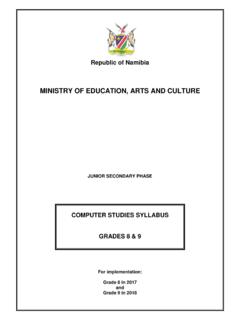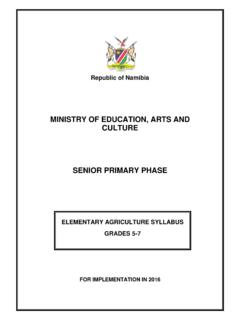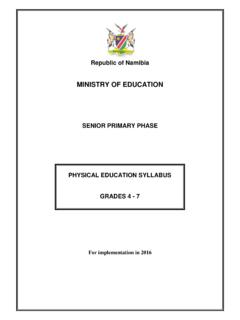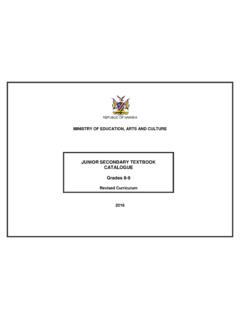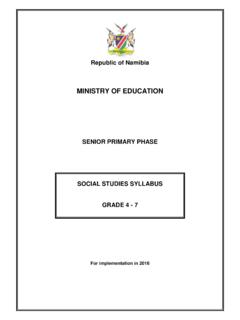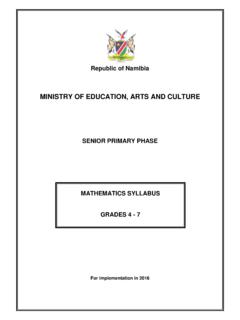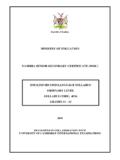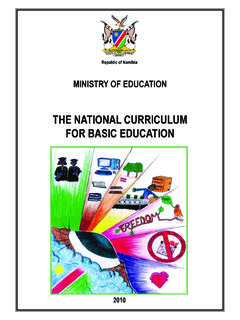Transcription of MINISTRY OF EDUCATION, ARTS AND CULTURE
1 Republic of Namibia MINISTRY OF EDUCATION, ARTS AND CULTURE . SENIOR PRIMARY PHASE. NATURAL SCIENCE AND HEALTH. EDUCATION SYLLABUS. GRADES 4 - 7. For implementation 2016. MINISTRY of Education, Arts and CULTURE National Institute for Educational Development (NIED). Private Bag 2034. Okahandja Namibia Copyright NIED, MINISTRY of Education, 2015. Natural Science and Health Education Syllabus Grades 4 7. ISBN: 978 99945 2 108 - 1. Printed by NIED. Website: Publication date: December 2015. TABLE OF CONTENTS. 1. 1. 2. 1. 3. 1. 4. Inclusive Education .. 1. 5. Links to Other Subjects and Cross-curricular Issues .. 2. 6. Approach to Teaching and Learning .. 3. 7. End of phase competencies .. 3. 8. Summary of the Learning Content .. 5. 9. Learning Content .. 6. grade 4 .. 6. grade 5 .. 11. grade 6 .. 22. grade 7 .. 31. 10. Assessment .. 42. Types and methods of assessment.
2 42. grade Descriptors .. 43. Assessment Objectives .. 44. Continuous assessment: Detailed guidelines .. 45. End of year examinations: Detailed guidelines .. 46. Specification Grids .. 49. 11. Assessment Criteria .. 49. 12. Additional Information .. 51. Annexe 1: Terms used in teaching and assessment .. 51. Annexe 2: Assessment Record Sheet for grade 4 (Term 1 and 2) .. 53. Annexe 3: Assessment Record Sheet for grade 4 (Term 3) .. 54. Annexe 4: Assessment Record Sheet for grade 5 .. 55. Annexe 5: Assessment Record Sheet for Grades 6 and 7 .. 56. 1. Introduction This syllabus describes the intended learning objectives and assessment for Natural Science and Health Education in the Senior Primary level. As a subject Natural Science and Health Education is within the natural scientific area of learning in the national curriculum, but has thematic links to other subjects across the curriculum.
3 Learning experiences in the natural scientific area aim at increasing the learners' knowledge and understanding of the physical and biological world of which they are part. The Natural Science and Health Education syllabi for the Senior Primary level/phase therefore integrate natural science, social, economic, physical, mathematical and technological learning areas of the broad curriculum and seek to motivate learners to effect changes in behaviour which promote good health and help them acquire and use the skills necessary to secure improvements in health. Critical thinking, investigating phenomena, interpreting data, and applying knowledge to experimental skills are essential to understanding the value and limitations of natural scientific knowledge and methods, and their application to daily life. The application of scientific knowledge and attitudes to health is of special relevance for the individual, the family, and society as a whole.
4 The MINISTRY of Education through NIED has agreed on a fixed review cycle. 2. Rationale Learning experiences in the natural scientific area are focused upon promoting teaching and learning for understanding. Namibia, like most African countries, is rich in natural resources. The exploration of these resources requires scientific knowledge and relevant skills. The acquisition of scientific knowledge and technical skills presents itself as a prerequisite for a progressive national economy and the improvement of better standards of life for our people as envisaged in the country's long term strategic plan of Vision 2030. It is thus important for our learners to acquire knowledge and skills which will foster their understanding of the interaction of the human being and the environment in order to satisfy human needs. It must be understood that both the physical and biological world around us is are quite complex and therefore need to be understood in a holistic manner by society in order to sustain the natural resources.
5 3. Aims The main aim of the Natural Science and Health Education syllabus within the natural scientific area is therefore to provide basic scientific background for our learners with the hope of producing the much-needed scientists for the country. The Namibian society needs to be scientifically literate if it is to cope with challenges of appropriate global technology and economic advancement of the country. 4. Inclusive Education The Senior Primary Phase of education promotes equality of opportunity to males and females, enabling both sexes to participate equally and fully. Teachers should know and understand how to treat learners equally, and all materials should support gender equity. Teachers must be aware of the ways in which boys or girls often become favoured in the classroom interaction, and ensure that their role promotes gender equity. Few learners will be able to manage the minimum number of competencies and should receive learning support through adapted teaching approaches, adapted materials, and assistance from peers.
6 It is essential that the Senior Primary Phase creates motivation and confidence in girls as much as in boys in Natural Science and Health Education. 1. NSHE Senior Primary Syllabus Grades 4 7, NIED 2015. 5. Links to Other Subjects and Cross-curricular Issues The cross-curricular issues include Environmental Learning; HIV and AIDS; Population Education; Education for Human Rights and Democracy (EHRD), Information and Communication Technology (ICT) and Road Safety. These have been introduced to the formal curriculum to be dealt with in each subject and across all phases, because each of the issues deals with particular risks and challenges in our Namibian society. All of our learners need to: understand the nature of these risks and challenges know how they will impact on our society and on the quality of life of our people now and in the future understand how these risks and challenges can be addressed on a national and global level understand how each learner can play a part in addressing these risks and challenges in their own school and local community.
7 The main risks and challenges have been identified as: the challenges and risks we face if we do not care for and manage our natural resources the challenges and risks caused by HIV and AIDS. the challenges and risks to health caused by pollution, poor sanitation and waste the challenges and risks to democracy and social stability caused by inequity and governance that ignores rights and responsibilities the challenges and risks we face if we do not adhere to road safety measures the challenges and risks we face from globalisation Since some subjects are more suitable to address specific cross-curricular issues, those issues will receive more emphasis in those particular syllabuses. In this syllabus the following are links to cross-curricular issues: Cross Curricular grade 4-5 grade 6 grade 7. Issues Plants and their Living organisms abiotic environment Diversity of organisms Environmental Plants Ecosystem Education Soil Ecology Ecosystem Living organisms The body's immune HIV and AIDS Health Education Health Education system Human Rights Environment Ecosystem Ecology and Democracy Information and Process skills: Hand Process skills: Process skills: Communication lens Hand lens Microscope Technology 2.
8 NSHE Senior Primary Syllabus Grades 4 7, NIED 2015. 6. Approach to Teaching and Learning The approach to teaching and learning is based on a paradigm of learner-centred education (LCE) described in ministerial policy documents and the LCE conceptual framework. This approach ensures optimal quality of learning when the principles are put into practice. The aim is to develop learning with understanding, including, skills and attitudes required to contribute to the development of society. The starting point for teaching and learning is based on the fact that the learner brings to the school a wealth of knowledge and social experience gained continually from the family, the community, and through interaction with the environment. Learning in school should thus involve, build on, extend and challenge the learner's prior knowledge and experiences. Learners learn best when they are actively involved in the learning process through a high degree of participation, contribution and production.
9 At the same time, each learner is an individual with his/her own needs, pace of learning, experience and abilities. The teacher must be able to sense the needs of learners, the nature of the learning to be done, and how to shape learning experience accordingly. Teaching strategies must therefore be varied but flexible within a well-structured sequence of lessons. The teacher should decide, in relation to the learning objectives and competencies in Natural Science and Health Education to be achieved, when: it is best to convey content directly it is best to let learners discover or explore information for themselves learners need directed learning learners need remedial and enrichment teaching and support there is a particular progression of skills or information that needs to be followed learners can be allowed to find their own way through a topic or area of content.
10 It is important to make sure that when learners work in groups, in pairs, individually, or as a whole class, the class must be organised appropriately to the task in hand. Co-operative and collaborative learning should be encouraged whenever possible. In such cases, tasks must be designed so that pair or group work is needed to complete it, otherwise the learners will not see any relevance in carrying out tasks together. As the learners develop personal, social and communication skills, they can gradually be given increasing responsibility to participate in planning and evaluate their work, under the teacher's guidance. The learning content in this syllabus is based on the Namibian context, although the themes and topics are on a variety of scales to meet international standards. Teachers are therefore urged, where appropriate, to use local examples to illustrate scientific issues, concepts and processes.

